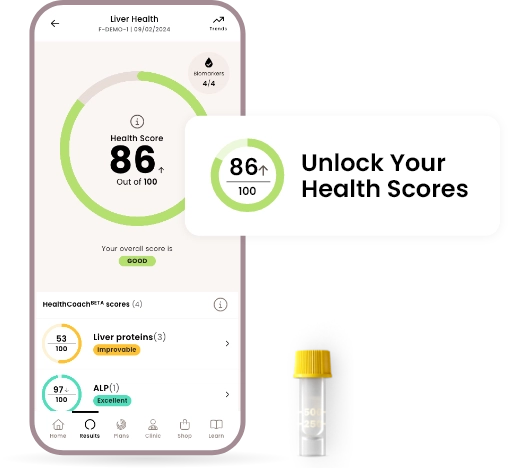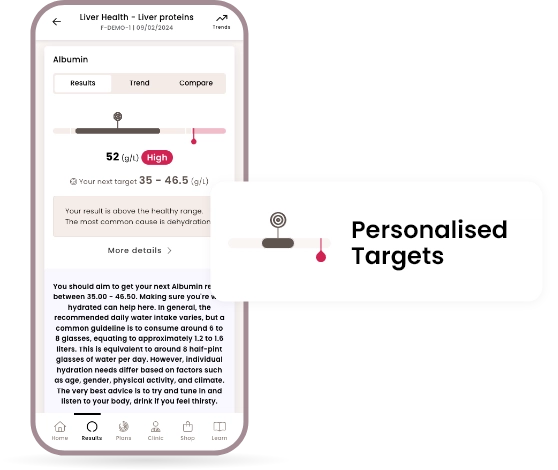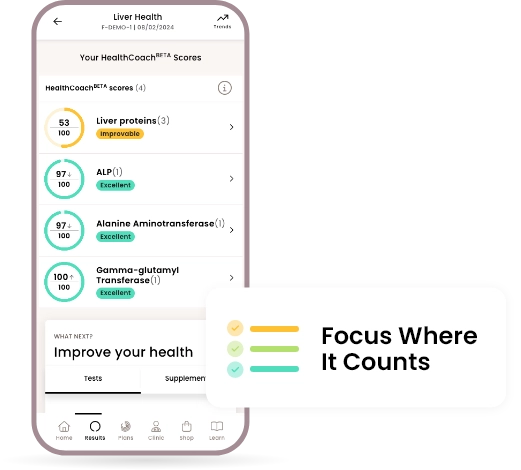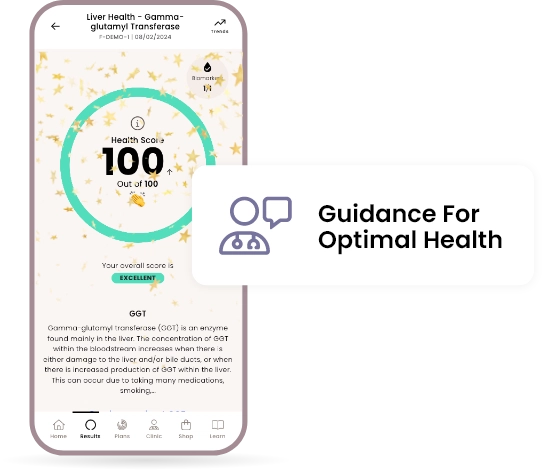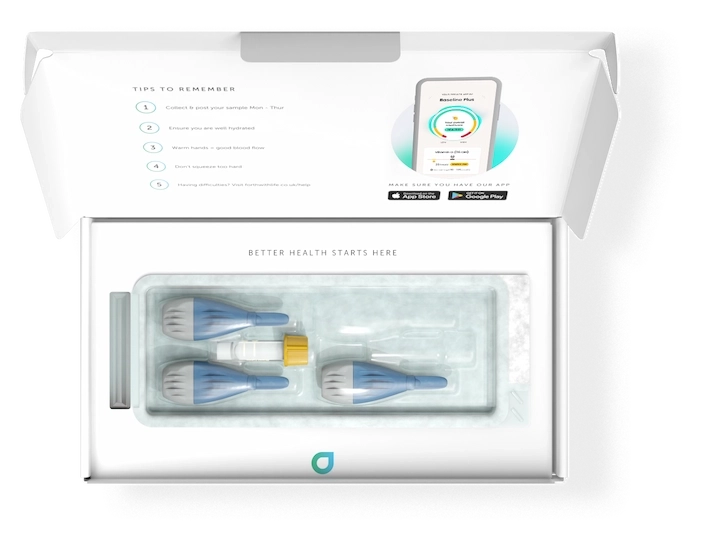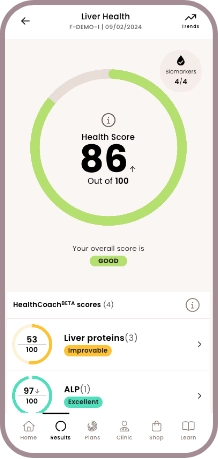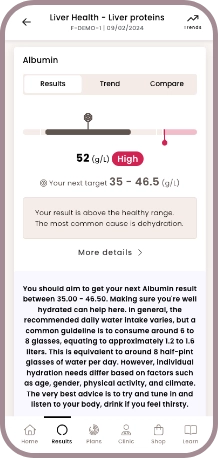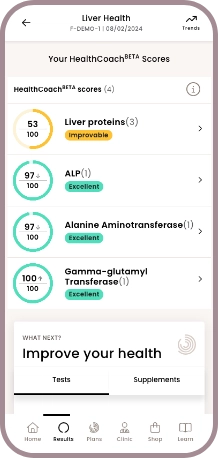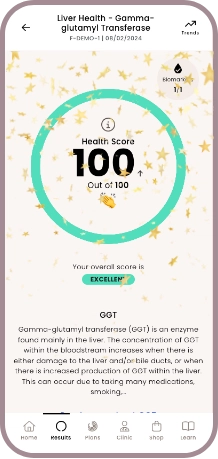About flexible subscriptions
How does a subscription work?
When you purchase this test subscription plan, we will automatically send you another test kit in a few months. Don't worry - you have full control over when this will be, and you can change/cancel it anytime.
When you first purchase this test, you can choose your subscription options in the checkout. We do this, because we recommend taking multiple tests over time to track how your biomarkers change. You'll be charged per test kit (rather than monthly, for example).
Why subscribe to multiple tests?
One test will show you what areas you need to focus on, continued testing will help you learn how your training, diet and lifestyle is impacting your health.
How often should I test?
We recommend a follow up test 3 months after your first test, followed by a test every 6 months depending on your results, but its up to you!
Can I change what's tested in future tests?
Yes, you can tailor/customise subsequent tests (via your app) to focus on just the areas that need improving.
Liver Function Blood Test
£49
Our at-home liver function blood test helps you check the health of your liver and kidneys. It checks important biomarkers like liver proteins, GGT and ALP for your liver, and creatinine and urea for your kidneys. Checking your liver function at home is a quick and easy way to avoid liver disease and live a healthier life.
Validated & analysed by NHS Lab
Tracked 24 delivery
Finger prick or venous collection
Results in 2 working days
Shop now. Pay over time with Klarna
Klarna available at checkout.
Klarna's Pay in 3 / Pay in 30 days are unregulated credit agreements. Borrowing more than you can afford or paying late may negatively impact your financial status and ability to obtain credit. 18+, UK residents only. Subject to status. Ts&Cs and late fees apply.
What gets tested?
10 Biomarkers
Blood sample collection options
How does it work?
When do I take the test?
If you have consumed a large amount of alcohol, we recommend leaving a gap of 72-96 hours before taking this test.
Certified for quality & security
Blood sample collection options
You can choose your preferred collection method when you checkout
Finger prick kit (FREE)
You can do this test at home without the need for a doctor. We'll send you everything you need to collect your sample and post it back to us. And it's all included in the cost. We've put together a video that covers the process, making it easy to check and track your health from home.
Home nurse appointment (+£60)
We'll arrange for a medical professional to visit your home and collect your sample. This is great if you're unsure on how it all works or have trouble collecting a sample. No need to book a doctor's appointment or visit a clinic, we'll send you everything you need to collect a sample and post it back to our labs.
Visit a partner clinic (+£45)
Once you've ordered your test, look out for an email from our phlebotomy partners containing information and a link to book your appointment. We'll send you everything the clinic will need to complete the sample and post it back to our labs.
Organise a nurse myself (FREE)
If none of the above options work for you, you can arrange your own medical professional to collect your sample. There is no additional charge for this. Once you've ordered your test, we'll send you everything you and your chosen medical professional will need to collect a sample and post it back to our labs.
Still unsure how it works? You can find more information on collection methods and the service we provide in our 'How it Works' section.
How does it work?
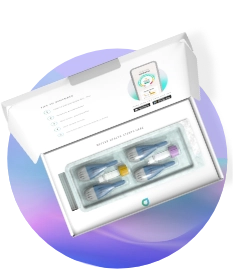
1. Choose your blood test
No need to wait for a GP appointment, your kit will arrive within 1-2 days, which includes everything you need to collect your blood sample and post it back to our labs.
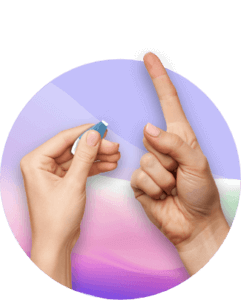
2. Collect your sample
Take your finger prick blood sample at home, or choose to have your blood taken at a Superdrug health clinic or a nurse at home. Return to our NHS lab using our prepaid envelope.
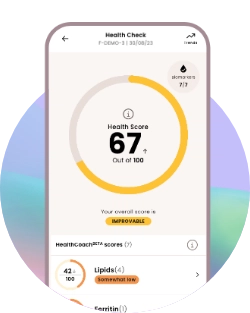
3. View your results
View your results on your secure health dashboard within 2 working days of our lab receiving your sample. Read personalised comments from our GPs.
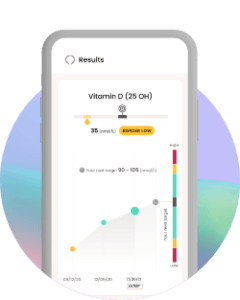
4. Make improvements
With more in-depth results, you will be able to identify areas that need improving. Make the changes and track your progress.
What gets tested?
10 Biomarkers Included
Additional biomarkers can be added by personalising this test.
What are biomarkers?
Biomarkers are specific compounds we can detect in your blood sample that reflect different things about your health. Your test will tell you your levels for each of the above biomarkers, and whether they are in a normal range.
Did you know?
9 out of 10 cases of liver disease could be prevented
British Liver Trust: Liver disease in numbers – key facts and statisticsUnlock your health scores with HealthCoach™
Powered by cutting-edge technology, Forth’s industry leading app goes beyond reporting basic biomarker results and one-size-fits-all health advice to deliver a comprehensive roadmap to better health.
Your Liver Function Blood Test will give you the following Health Scores
Liver health
Kidney health
What does a liver blood test check?
If you’re worried that your lifestyle might be impacting your liver, our test will help give you peace of mind or identify areas for improvement. Understanding how well your liver is functioning will help you take more control over your health and make the right lifestyle changes for you. This test checks 6 key biomarkers related to liver health.
How to check liver function at home
Our liver function blood test is an at-home finger prick test that makes it easy to collect your blood in just a few minutes. It comes with everything you need to do the test, including free return postage to our labs for analysis. We’ve put together a full how-to video to help you collect your blood sample.
Frequently asked questions
This is what our customers ask us most about this test. For more information, try our help centre.
What does the liver do?
The liver is a very important organ as it filters all of our blood, filtering out poisonous substances like drugs and alcohol. It also produces bile which is integral to digestion.
What are the first signs of liver disease?
The signs of liver disease can include:
- loss of appetite
- feeling tired and weak
- loss of libido
- yellow skin and white of the eyes (jaundice)
- feeling nauseous
- feeling itchy
How can I keep my liver healthy?
Remember that your liver has to work hard to filter out harmful substances in your blood, what you eat and drink has an important part to play in ensuring a healthy liver.
The following can help to ensure a healthy liver:
- moderate the amount of alcohol you drink (NHS alcohol support)
- drinking a few cups of coffee may reduce cirrhosis (scarring) of the liver
- practise safe sex to avoid hepatitis C, which infects the liver
- monitor the use of prescription drugs that may harm your liver
- be careful what supplements you take as your liver can be harmed by: coltsfoot, comfrey, groomwell, and borage
- eat a wide range of fruits and vegetables as part of a balanced diet low in ultra-processed foods
- exercise and keep a healthy BMI
- monitor your liver function with blood tests
How soon will the test arrive?
If you order your test before midday on a Monday to Friday then your kit will be dispatched
the same day.
All our kits are sent out via Royal Mail first class post, so it should be with you within 1-2
working days.
How secure is my data?
We have strict processes in place to ensure the protection of your data. Following GDPR the company also operates under tight legal rules about the sharing of data which ensures that data is only shared if it is crucial to the delivery of our service. For example, our doctors see customer results at the time of review, however, after review, access to results is withdrawn.
Learn more about your data security.
Can I have someone take my blood for me?
Yes. We offer two options if you do not want to do our finger prick test. The first is a home appointment where a nurse comes to your home to take a blood sample. The second is to visit a Phlebotomy clinic near you that offers a blood sample service.
A blood sample will be taken from your vein and we will provide you with everything you need to give to the nurse to allow them to take the sample.
The nurse will give you the blood sample to return to us using the pre-paid envelope provided.
Does a doctor review my results?
We have a team of doctors and nurses who look at all results and will comment on any results that are outside of the normal range for your age.
Can I download the results to share with my GP?
Yes, you can download your results from your health dashboard as a PDF to share with your GP.
Learn how to export your results.
We are dedicated to supporting you on improving your health
Go to help center
Liver Function Blood Test, recommended by our doctors
"Your liver is the body's major processing centre. A liver function test measures various enzymes, proteins, and substances in your blood that are involved in a number of metabolic pathways. The results show if your liver is functioning properly, helping assess the impact of diet, alcohol, exercise and some medications."
Dr Thom Phillips
Similar tests
- Health scores calculated
Close
We're changing people's lives
How our Liver Function Blood Test works
Getting the insights you need to improve your health has never been easier.

1. Choose your blood test
No need to wait for a GP appointment, your kit will arrive within 1-2 days, which includes everything you need to collect your blood sample and post it back to our labs.

2. Collect your sample
Take your finger prick blood sample at home, or choose to have your blood taken at one of our partner clinics or a nurse at home. Return to our NHS lab using our prepaid envelope.

3. View your results
View your results on your secure health dashboard within 2 working days of our lab receiving your sample. Read personalised comments from our GPs.

4. Make improvements
With more in-depth results, you will be able to identify areas that need improving. Make the changes and track your progress.
What's included in this test?
1x Yellow Tube
3x Lancets

1x Cleansing wipes

Plasters

2x Alcohol swabs
1x Return pouch

1x Tracked 24 return envelope

1x Lab request form
Blood sample kit
Results within 2 working days
Tracked 24 delivery & return
Secure health dashboard
Accredited lab analysis
Doctor reviewed results
Our impact in numbers...
70+
From hormones to nutrients, we offer 70+ different tests
60,000+
We've helped over 60,000 people improve their health
800,000+
We've delivered over 800,000 test results
Related articles
Like this article? Here are some more based on similar topics.
Liver Function Blood Test

